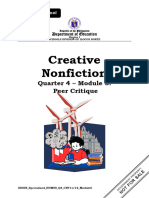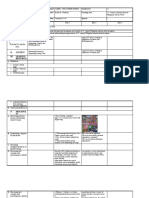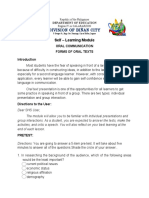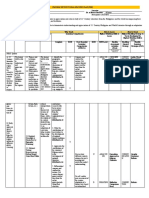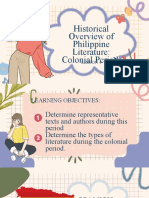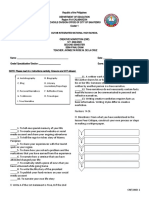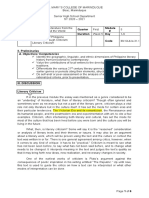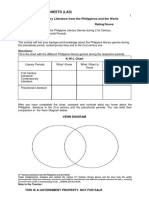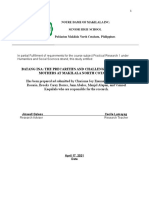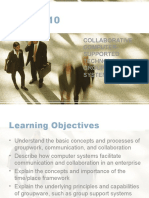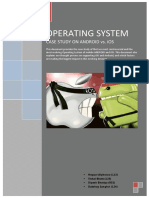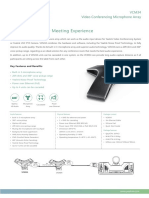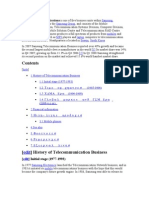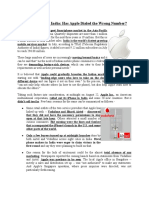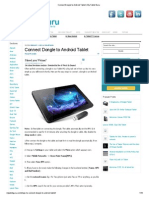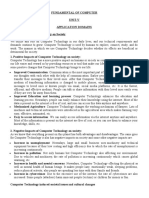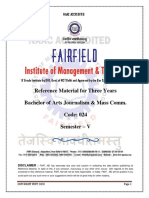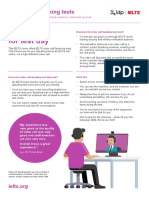0 ratings0% found this document useful (0 votes)
188 viewsIct Skills in Literary
Ict Skills in Literary
Uploaded by
Princes Diane FielThis document discusses ICT skills and how they can be used in literary text adaptation. It defines ICT as information and communication technology, such as using computers, tablets, phones, email, internet, etc. It then lists some key ICT skills like data management, online research, email use, social media management, desktop publishing, online collaboration, smartphone/tablet use, and word processing. The document also defines literary adaptation as adapting a literary work such as a novel or story into another genre or medium like a film, play, or game. This involves translating the creative work from one format to another while maintaining the original story, characters, and themes. Digital storytelling is mentioned as using text, pictures, and
Copyright:
© All Rights Reserved
Available Formats
Download as PPTX, PDF, TXT or read online from Scribd
Ict Skills in Literary
Ict Skills in Literary
Uploaded by
Princes Diane Fiel0 ratings0% found this document useful (0 votes)
188 views8 pagesThis document discusses ICT skills and how they can be used in literary text adaptation. It defines ICT as information and communication technology, such as using computers, tablets, phones, email, internet, etc. It then lists some key ICT skills like data management, online research, email use, social media management, desktop publishing, online collaboration, smartphone/tablet use, and word processing. The document also defines literary adaptation as adapting a literary work such as a novel or story into another genre or medium like a film, play, or game. This involves translating the creative work from one format to another while maintaining the original story, characters, and themes. Digital storytelling is mentioned as using text, pictures, and
Original Title
ICT-SKILLS-IN-LITERARY
Copyright
© © All Rights Reserved
Available Formats
PPTX, PDF, TXT or read online from Scribd
Share this document
Did you find this document useful?
Is this content inappropriate?
This document discusses ICT skills and how they can be used in literary text adaptation. It defines ICT as information and communication technology, such as using computers, tablets, phones, email, internet, etc. It then lists some key ICT skills like data management, online research, email use, social media management, desktop publishing, online collaboration, smartphone/tablet use, and word processing. The document also defines literary adaptation as adapting a literary work such as a novel or story into another genre or medium like a film, play, or game. This involves translating the creative work from one format to another while maintaining the original story, characters, and themes. Digital storytelling is mentioned as using text, pictures, and
Copyright:
© All Rights Reserved
Available Formats
Download as PPTX, PDF, TXT or read online from Scribd
Download as pptx, pdf, or txt
0 ratings0% found this document useful (0 votes)
188 views8 pagesIct Skills in Literary
Ict Skills in Literary
Uploaded by
Princes Diane FielThis document discusses ICT skills and how they can be used in literary text adaptation. It defines ICT as information and communication technology, such as using computers, tablets, phones, email, internet, etc. It then lists some key ICT skills like data management, online research, email use, social media management, desktop publishing, online collaboration, smartphone/tablet use, and word processing. The document also defines literary adaptation as adapting a literary work such as a novel or story into another genre or medium like a film, play, or game. This involves translating the creative work from one format to another while maintaining the original story, characters, and themes. Digital storytelling is mentioned as using text, pictures, and
Copyright:
© All Rights Reserved
Available Formats
Download as PPTX, PDF, TXT or read online from Scribd
Download as pptx, pdf, or txt
You are on page 1of 8
I C T S K I L L S I N L I T E R A RY
T E X T A D A P TAT I O N
ICT SKILLS IN LITERARY
TEXT ADAPTATION
21st Century Literature
Lesson 3
WHAT IS ICT?
ICT stands for 'Information Communication Technology'. Everyday usage of digital
technology includes when you use a computer, tablet or cell phone, send email, browse the
internet, make a video call - these are all examples of using basic ICT skills and technology to
communicate.
Information and communications technology (ICT) skills refer to one’s ability to converse with
people through various technologies. Like information technology (IT), ICT refers to
technology use for regular, everyday tasks: sending an email, making a video call, searching
the internet, using a tablet or cell phone, and more. Ironically, ICT skills could also include the
ability to use older communication technologies such as telephones, radios, and televisions.
Typically, ICT experts are called upon to integrate old communication technology with the new
technology. Almost every job requires some ICT skills, and many require hybrid skills, a skill
set that is a mix of technical and non-technical skills.
ICT SKILLS
• Data Management and Queries Develop and manage data using
spreadsheets to be able to analyze that data and recognize trends
and patterns such as Microsoft Excel.
• Online Research able to sift through all the information online to
find what you need involving basic online information management
skills.
• Email Management and Setup able to effectively and successfully
communicate via email.
ICT SKILLS
Social Media Management Use of social media such Facebook,
Instagram, Twitter, YouTube, and Pinterest in valuable ways.
• Desktop Publishing Creation of materials that need to be printed and
distributed such as fliers, brochures, newsletters, and more. using
desktop publishing software like MS Publisher, MS Powerpoint, MS
Word, Print Setting , and etc.
ICT SKILLS
Online Collaboration Sharing information with your coworkers, or friends, online
such as a meeting to a shared online calendar, providing feedback on a document
through a web-based document application, and holding an online video conference
with colleagues.
• Smartphones and Tablets The use of smartphones and tablets so it is easily
accessible during certain hours of the day.
• Word Processing In this day and age, it is expected that individuals know how to use
word processing technology to be able to produce written documents (including
business letters, meeting minutes, and more) using a computer processor such as
Microsoft Word.
WHAT IS LITERARY
ADAPTATION?
• Literary adaptation is the adapting of a literary source (e.g. a novel, short story,
poem) to another genre or medium, such as a film, stage play, or video game.
• It refers to the process of translating a creative work from one medium to another:
a novel adapted into a film, for example. Hamlet has been adapted into operas:
Ambrose Thomas' 1868 version in French, and Franco Faccio's 1865 Amleto in
Italian.
WHAT IS LITERARY
ADAPTATION?
• It can also involve adapting the same literary work in the same genre or medium just
for different purposes, e.g. to work with a smaller cast, in a smaller venue (or on the
road), or for a different demographic group (such as adapting a story for children).
Sometimes the editing of these works without the approval of the author can lead to
a court case.
• It also appeals because it obviously works as a story; it has interesting characters,
who say and do interesting things. This is particularly important when adapting to a
dramatic work, e.g. film, stage play, teleplay, as dramatic writing is some of the
most difficult. To get an original story to function well on all the necessary
dimensions—concept, character, story, dialogue, and action—is an extremely rare
event performed by a rare talent.
DIGITAL STORYTELLING
The process of crafting the digital story builds communication,
creativity, visual and sound literacy, and project management skills.
Telling your stories with text, pictures, and your own narration is easy.
Frames helps you engage your audience with features like pan and
zoom, the ability to match frame duration to sound recording, and more.
You might also like
- PT in Personal DevelopmentDocument2 pagesPT in Personal DevelopmentrusselNo ratings yet
- What Is Text, Discourse DefinedDocument2 pagesWhat Is Text, Discourse DefinedChristine BlabagnoNo ratings yet
- Vasquez, L. M., & Lee, G. (2017) - Creative Writing. Manila: Rex Book Store Inc.Document2 pagesVasquez, L. M., & Lee, G. (2017) - Creative Writing. Manila: Rex Book Store Inc.Angelie Shan NavarroNo ratings yet
- 21st Century Lit Week 1 PDF ofDocument75 pages21st Century Lit Week 1 PDF ofEushane Chiya SyNo ratings yet
- 21st Century World Literature - IntroductionDocument13 pages21st Century World Literature - IntroductionGerishNillasGeeNo ratings yet
- HUM 101 SyllabusDocument14 pagesHUM 101 SyllabusMa Anna Cris LumongsudNo ratings yet
- Lesson Plan in 21st Century Literature FDocument8 pagesLesson Plan in 21st Century Literature Fjessie Ocs100% (1)
- Bow - 21ST CenturyDocument5 pagesBow - 21ST CenturyFlorina Nadorra RamosNo ratings yet
- Eapp Semi DetailedDocument36 pagesEapp Semi DetailedDin Flores MacawiliNo ratings yet
- 21st Century Script RoleplayDocument2 pages21st Century Script Roleplaylight laytueNo ratings yet
- Text As A Connected DiscourseDocument10 pagesText As A Connected DiscourseJa-ja CabaticNo ratings yet
- HUMSS CreativeNonfiction Q4 Mod6 W34 PeerCritiqueDocument23 pagesHUMSS CreativeNonfiction Q4 Mod6 W34 PeerCritiqueRhaziela Eunika MalabagNo ratings yet
- 21clpw 3 Weeks Quarter 3 GamayonDocument39 pages21clpw 3 Weeks Quarter 3 GamayonAyman The Ez GamerNo ratings yet
- BOL 21st CenturyDocument3 pagesBOL 21st CenturyShē FæëlnärNo ratings yet
- 21ST Century Literature From The Philippines To The World June 26, 2019Document6 pages21ST Century Literature From The Philippines To The World June 26, 2019JUAN DELA CRUZNo ratings yet
- LP July 18 - Emerging Trends in Philippine LiteratureCreative NonfictionDocument1 pageLP July 18 - Emerging Trends in Philippine LiteratureCreative Nonfictionbea locsinNo ratings yet
- Activity Sheet DIASS Q1, W4 1ST-2021 2022Document6 pagesActivity Sheet DIASS Q1, W4 1ST-2021 2022ROYLAN HOPE PETILUNANo ratings yet
- Daily Lesson Log: EN12Lit - Ia-21Document2 pagesDaily Lesson Log: EN12Lit - Ia-21Christian Joy OlarteNo ratings yet
- Lesson Plan in 21st Century - 8Document5 pagesLesson Plan in 21st Century - 8rogelyn samilinNo ratings yet
- Creative Representation of A Literary Text by Applying Multimedia Skills (Activity)Document2 pagesCreative Representation of A Literary Text by Applying Multimedia Skills (Activity)Jas De Guzman100% (1)
- School Grade Level Teacher Learning Area: I. ObjectivesDocument4 pagesSchool Grade Level Teacher Learning Area: I. ObjectivesCow Cow Cow100% (1)
- DLP Oral Com En11 12 Oc Ia 17Document5 pagesDLP Oral Com En11 12 Oc Ia 17Romy Sales Grande Jr.No ratings yet
- DLL-21ST (4TH Week)Document5 pagesDLL-21ST (4TH Week)rubielNo ratings yet
- Division of Biñan City: Self - Learning ModuleDocument7 pagesDivision of Biñan City: Self - Learning ModuleBayoyong NhsNo ratings yet
- M1L1 For StudentsDocument24 pagesM1L1 For StudentsRoxette Marie100% (1)
- DLL Oral ComDocument6 pagesDLL Oral Comrahib l. makasimbualNo ratings yet
- Lesson Plan in English 12: Andres Bonifacio Integrated SchoolDocument6 pagesLesson Plan in English 12: Andres Bonifacio Integrated SchoolVhergel Mhartinez100% (1)
- Flexible Instructional Delivery Plan (Fidp) : DemonstrateDocument12 pagesFlexible Instructional Delivery Plan (Fidp) : DemonstrateEddie OdsonNo ratings yet
- Creative Writing BowDocument5 pagesCreative Writing BowJabie TorresNo ratings yet
- Comparing and Contrasting The Various 21st Century Literary Genres and Their Elements Structures and Traditions From Across The GlobeDocument7 pagesComparing and Contrasting The Various 21st Century Literary Genres and Their Elements Structures and Traditions From Across The GlobeMaria Gardon ConchadaNo ratings yet
- 21st Century Lit Curriculum MapDocument3 pages21st Century Lit Curriculum MapJennette TrinityNo ratings yet
- Lesson 4 - Colonial PeriodDocument45 pagesLesson 4 - Colonial PeriodDivine Camacho-LanabanNo ratings yet
- 21st-Budget of LessonDocument4 pages21st-Budget of LessonAbi Refugio Cabuñag100% (1)
- Multimedia Formats in Interpreting Literary TextDocument33 pagesMultimedia Formats in Interpreting Literary TextjoemarievillezaNo ratings yet
- Teaching Guide 21st Century LitDocument6 pagesTeaching Guide 21st Century LitLeah ArabesNo ratings yet
- Week 2 21st CLDocument4 pagesWeek 2 21st CLAristotle Tomas100% (2)
- 21st Century Literature 1 FinalDocument6 pages21st Century Literature 1 FinalRegidor AnalynNo ratings yet
- Performance Task # 1 in 21st Century LiteratureDocument4 pagesPerformance Task # 1 in 21st Century LiteratureJessica Barguin100% (1)
- 21ST Century Module 3Document4 pages21ST Century Module 3FordzNo ratings yet
- Types of Speech StyleDocument18 pagesTypes of Speech StyleShyrell CepilloNo ratings yet
- CreativeNonfiction12 q3 Mod3 Evaluatingandrevisingvariouscreativenonfictiontexts v5Document25 pagesCreativeNonfiction12 q3 Mod3 Evaluatingandrevisingvariouscreativenonfictiontexts v5apriljean.daguimolNo ratings yet
- 21st Century Literature GenreDocument30 pages21st Century Literature GenreJiilllNo ratings yet
- 21st Century Literature PDFDocument105 pages21st Century Literature PDFStephanie Nicole PabloNo ratings yet
- 21ST Century Literature Week1Document13 pages21ST Century Literature Week1Justine Mae AlveroNo ratings yet
- CNF 4TH QuarterDocument3 pagesCNF 4TH QuarterJhonel Mogueis Dela CruzNo ratings yet
- Literal LanguageDocument11 pagesLiteral LanguageAlexies Jane OlaNo ratings yet
- How To Contribute To The Development of Local LiteratureDocument5 pagesHow To Contribute To The Development of Local LiteratureAcilla Mae BongoNo ratings yet
- Q1 MODULE 5 - TOPIC5-Remapping of Philippine Literature Through Criticism Literary CriticismDocument6 pagesQ1 MODULE 5 - TOPIC5-Remapping of Philippine Literature Through Criticism Literary CriticismKristel Ann MontianoNo ratings yet
- Course Outline Purposive Communication 2021Document3 pagesCourse Outline Purposive Communication 2021Aljo KimayongNo ratings yet
- 21ST Century Literature - Q3 - Las 2Document6 pages21ST Century Literature - Q3 - Las 2Shiva Avel YeeNo ratings yet
- Formulating Assertions and CounterclaimsDocument33 pagesFormulating Assertions and CounterclaimsGerald Rosario FerrerNo ratings yet
- Detailed Lesson Plan in Personal Development 11Document16 pagesDetailed Lesson Plan in Personal Development 11James R JunioNo ratings yet
- EEAPG11 Q2 Mod6 Writing-The-position-paper v2Document24 pagesEEAPG11 Q2 Mod6 Writing-The-position-paper v2Carenlagrante RodriguezNo ratings yet
- Creative Writing LP 6Document8 pagesCreative Writing LP 6Jennifer MendozaNo ratings yet
- Lesson Plan in 21 Century Literature: University of The Philippines Visayas Division of Professional EducationDocument4 pagesLesson Plan in 21 Century Literature: University of The Philippines Visayas Division of Professional EducationJohn Edsel Guarnes CerbasNo ratings yet
- English: 21st Century Literature From The Philippines and The World-Quarter 1Document12 pagesEnglish: 21st Century Literature From The Philippines and The World-Quarter 1Jessica Aquino BarguinNo ratings yet
- Lesson Plan in 21st Century - 2Document5 pagesLesson Plan in 21st Century - 2rogelyn samilinNo ratings yet
- EAPP - LAS (Week 2)Document5 pagesEAPP - LAS (Week 2)Mercy Ann Leynes-AvenillaNo ratings yet
- Semi Detailed Lesson Plan in Oral CommunicationDocument2 pagesSemi Detailed Lesson Plan in Oral CommunicationTingting Ali100% (1)
- Week 5 D 1Document15 pagesWeek 5 D 1Princes Diane FielNo ratings yet
- Textual EvidenceDocument22 pagesTextual EvidencePrinces Diane FielNo ratings yet
- BATANG INA The Precarities and Struggles of Teenage Mothers at Makilala North Cotabato 1Document35 pagesBATANG INA The Precarities and Struggles of Teenage Mothers at Makilala North Cotabato 1Princes Diane FielNo ratings yet
- CliamsDocument20 pagesCliamsPrinces Diane FielNo ratings yet
- Collaborative Computer-Supported Technologies and Group Support SystemsDocument59 pagesCollaborative Computer-Supported Technologies and Group Support SystemsLuyando HamasakaNo ratings yet
- Smartphone Market and TechnologiesDocument15 pagesSmartphone Market and Technologiesmonther32No ratings yet
- Communication For Work PurposesDocument53 pagesCommunication For Work PurposesJames RomaNo ratings yet
- Operating System: Case Study On Android vs. IosDocument15 pagesOperating System: Case Study On Android vs. IosNguyễn ViệtNo ratings yet
- Maths Notes F6 Kentai S6 Elite 7 Advanced Probability PDFDocument113 pagesMaths Notes F6 Kentai S6 Elite 7 Advanced Probability PDFPak Hei ChanNo ratings yet
- Notes For Engineering - Theory of ComputationDocument25 pagesNotes For Engineering - Theory of Computationshambhavi26No ratings yet
- 10 20210829 144759Document3 pages10 20210829 144759Thando MalazaNo ratings yet
- Cause List PB 05.03.2024Document10 pagesCause List PB 05.03.2024Ashish ParasharNo ratings yet
- 3G Compatibility ListDocument8 pages3G Compatibility ListAdam FluertyNo ratings yet
- Demo Lesson Plan 3Document6 pagesDemo Lesson Plan 3Betelguese Abarico50% (2)
- Trick 1Document3 pagesTrick 1Fabio Gemesio100% (1)
- Yealink VCM34 DatasheetDocument2 pagesYealink VCM34 DatasheetVálóczi NorbertNo ratings yet
- Cap 10 A LARGO 2 LIBRODocument20 pagesCap 10 A LARGO 2 LIBROcamilaNo ratings yet
- Key Word RecordDocument8 pagesKey Word RecordJamie JordanNo ratings yet
- Samsung Telecommunications Is One of Five BusinessDocument4 pagesSamsung Telecommunications Is One of Five BusinesssolidvenkiNo ratings yet
- Symbian OSDocument22 pagesSymbian OSapi-3738458No ratings yet
- Iphone Launch in India: Has Apple Dialed The Wrong Number?Document4 pagesIphone Launch in India: Has Apple Dialed The Wrong Number?xumraah6319No ratings yet
- Connect Dongle To Android Tablet - My Tablet GuruDocument16 pagesConnect Dongle To Android Tablet - My Tablet GururajsalgyanNo ratings yet
- Redmi 2 Stuck LogoDocument7 pagesRedmi 2 Stuck LogoF- BoxNo ratings yet
- Unit-5 FOCDocument8 pagesUnit-5 FOCNarendra SahuNo ratings yet
- BJMC 5thsem PDFDocument285 pagesBJMC 5thsem PDFPrashant PalNo ratings yet
- Iphone 11plus Sizein MM - Google SearchDocument1 pageIphone 11plus Sizein MM - Google SearchRutvik vekariyaNo ratings yet
- UC-M70-U: Crestron Flex Tabletop Large Room Video Conference SystemDocument5 pagesUC-M70-U: Crestron Flex Tabletop Large Room Video Conference Systemshan76palNo ratings yet
- List of LTE NetworksDocument49 pagesList of LTE NetworkstangertolsNo ratings yet
- NALSA SOP - Functioning of Prison Legal Aid Clinics 2022Document25 pagesNALSA SOP - Functioning of Prison Legal Aid Clinics 2022C.P,1, PUZHALNo ratings yet
- Case For Walton Technologies CorporationDocument2 pagesCase For Walton Technologies CorporationTory IslamNo ratings yet
- Đề Và Đáp Án Thi Thử Nhóm 9+ Lần 1Document14 pagesĐề Và Đáp Án Thi Thử Nhóm 9+ Lần 1Fam DasNo ratings yet
- Catálogo de Repuestos: 318 683 4631 Celusilva Cursos 350 530 0174Document9 pagesCatálogo de Repuestos: 318 683 4631 Celusilva Cursos 350 530 0174Javier ReyNo ratings yet
- Top 10 Business Communication Trends: 1. Continued Shift Towards MobileDocument3 pagesTop 10 Business Communication Trends: 1. Continued Shift Towards MobileBumble BeeNo ratings yet
- idp Email Schedular Cluster/Mail Templates//RSD/RSDDocument1 pageidp Email Schedular Cluster/Mail Templates//RSD/RSDashu PatelNo ratings yet












